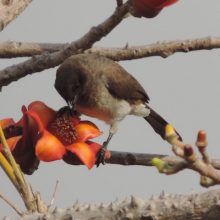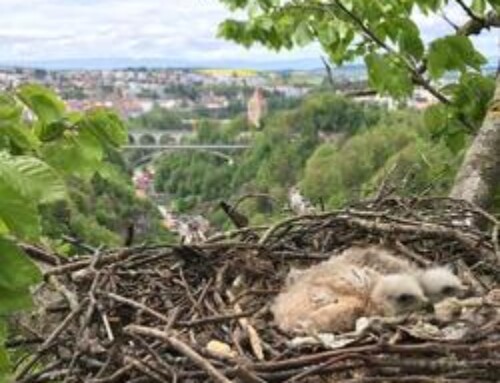
The BOU and the Early Career Researcher –
a personal perspective from a developing country ECR member.
The BOU ECR travel grant I received ensured that I did not miss the most important International Ornithological Congress (IOC) of my early career in ornithology due to lack of funds. Although the grant did not cover the entire cost of attending the conference, it was an important bargaining chip to help me obtain the extra funds I required.
My first opportunity to attend the IOC as a PhD student came during the 2014 IOC in Beijing. Unfortunately, because I was just four months into my PhD program and had no data that justified the use of my PhD funds to travel to Beijing, I missed that opportunity – of course I attended several other conferences, but they were not the same.
This IOC (IOCongress2018) in Vancouver came just as my PhD contract expired. Although I was determined to attend, I knew I needed independent funding, or at least a reasonable justification to access travel funds from my PhD funding after my contract had ended. The first BOU ECR travel grant was just enough to bargain for this additional funds from my supervisors. All I needed to be at that crucial moment was an ECR member of the BOU – which I was, still am and will continue to be! There is so much value to be enjoyed by being a member of the BOU, especially for ornithologists from developing countries.
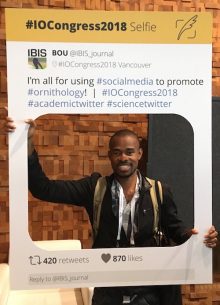
The range of the BOU grants and bursaries build up into a complete package for early career development. In addition to this recently introduced BOU ECR grant, the BOU has small research grants to support ornithology projects in developing countries and an early career development bursary that provides funding for ECR members to train in an aspect of ornithology for 10 weeks at a University, Government agency or NGO.
In my opinion, there is hardly a better place to find a host for ornithological training than the IOC. You can be rest assured that I did not miss the opportunity of finding a willing host for a research project and a couple of potential post-doctoral collaborators to explore. But don’t ask for names! If you check my profile in the coming months, you will find out exactly how much was achieved by attending IOCongress2018 in Vancouver. The catch here is that, despite the limited funding for ornithology in developing countries, an early career ornithologist can make a huge career step (even without being formally registered for a PhD) by simply taking advantage of the grants (perhaps, taken one at a time). Interestingly, these grants are available to non-BOU members from developing countries.
Now back to the IOCongress2018 Vancouver!
The event brought the largest gathering of ornithologists I have ever met, and it was fascinating (of course the beauty of Vancouver was an additional attraction). I had the opportunity of putting a face to numerous authors I had read and cited throughout my studies (with special thanks to those who redesigned their badges for better visibility) – this was the highlight of IOCongress2018 for me.
My research, using the Common Bulbul Pycnonotus barbatus, aims at understanding how variation in environmental conditions lead to variation in immune function.

In my own talk I discussed how diet affects body condition and innate immune function in birds. Birds shift between different food items due to changes in environment, behaviour or food availability over the course of the year. In our study, we showed that for Common Bulbuls, a diet of fruits better supports body condition and innate immune function than a diet of invertebrates.
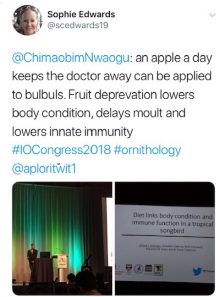
This suggests the superior health benefit of a vegetarian diet. Our results can be applied widely and were well received; as observed from tweets and discussions that followed – stay tuned for a paper that is currently being prepared on these results.
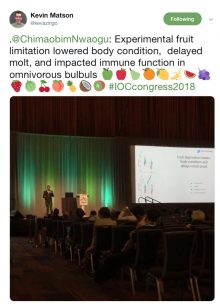
Another great thing about IOCongress2018 was that it was not restricted to academic presentations alone. Apart from the Vancouver bird fair and the numerous social events that took place, two non-academic aspects that featured prominently during the week were the BOU’s social media campaign and the Early Professional Futures Forum which brought ECRs together on a very friendly question and answer session. The Early Professional Futures Forum was supported by the American Ornithological Society and the European Ornithologists’ Union. The take home message from both the social media discussions and the ECR event is that there is more to a successful early career than coming up with brilliant research questions and working round the clock – it is equally important to make your research visible via social media outlets while maintaining a formidable network. But lest I forget, when applying for that next position, don’t shy away from seeking insider details, it might just make you stand out – many people are as qualified as you are, please call contact persons to verify any ambiguity and note that most calls for application are not open!
I am still overwhelmed at just how much happened for my career in just one week of being with the right people, at the right place and at the right time. In my opinion, the best time to attend the IOC is at the end of the PhD, but sadly, only about a quarter of PhD students have the IOC coincide with their final year. For many others, the opportunity may come at any time during their PhD. If this comes too early or almost too late, as it did for me, then the BOU ECR grant may be a good funding alternative, and I hope that the initiative is sustained and made available for other major ornithology conferences like the EOU and the POAC.
Image credit
Featured image:Common Bulbul feeding on nectar from Bombax costatum at the Amurum Forest Reserve in central Nigeria. Photo © John Christopher.
If you want to write about your research in #theBOUblog, then please see here.



